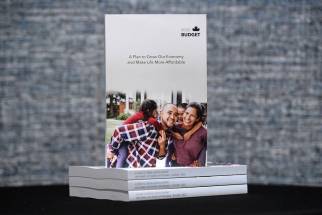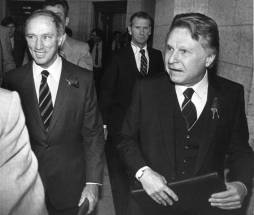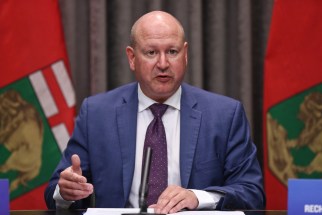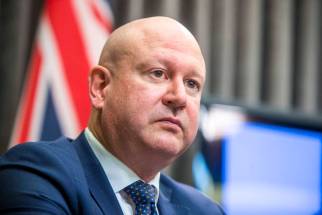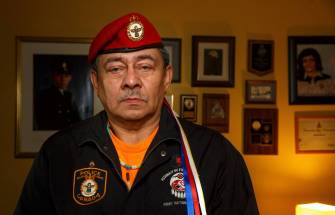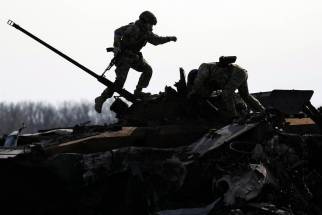A journey of healing Indigenous elder, military veteran and residential school survivor has found peace after all these years
Read this article for free:
or
Already have an account? Log in here »
To continue reading, please subscribe:
Monthly Digital Subscription
$19 $0 for the first 4 weeks*
- Enjoy unlimited reading on winnipegfreepress.com
- Read the E-Edition, our digital replica newspaper
- Access News Break, our award-winning app
- Play interactive puzzles
*No charge for four weeks then billed as $19 plus GST every four weeks. Offer only available to new and qualified returning subscribers. Cancel any time.
Read unlimited articles for free today:
or
Already have an account? Log in here »
Hey there, time traveller!
This article was published 06/04/2022 (993 days ago), so information in it may no longer be current.
Melvin Swan is a proud Indigenous military veteran.
His awards and military decorations hang on the wall of the living room, a prominent display of his service, and a big part of who he is. Most noticeable is a large picture of a young Swan wearing a military police uniform; a timeless capture of a young warrior with a baby face and hardened eyes.
“My life’s been a war, I’ll tell ya,” he says sitting in an armchair in the North Kildonan home that he shares with his wife, Una, and their three cats Boots, Shadow and Zoro.
“I had a stroke in April 2012, I took on the army for discrimination back in ’94,” he says almost immediately after introducing himself.
These are two significant experiences that have shaped Swan’s adult life. He is an open book, and he speaks candidly from the heart. His speech is a little bit slurred — a lasting remnant of that stroke — though the words he says barge through and carry the truth and confidence of a man who never stopped fighting.
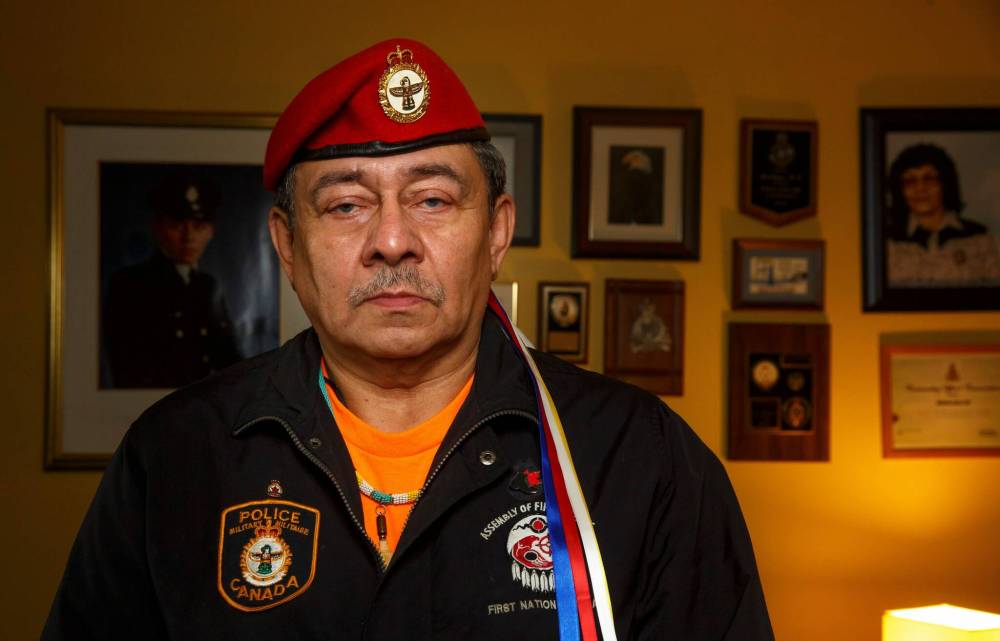
When asked how his discrimination fight went, Swan replies: “I won, but it wasn’t very much of a settlement.”
The retired corporal is also an elder, knowledge keeper, a pipe carrier, and sun dancer from Dog Creek, a reserve near the narrows of Lake Manitoba. Born Feb. 27, 1959, he was the first of late Chief Raymond Swan and Mary Emma Jane Spence’s nine children. Swan’s life story is the latest instalment of a new Free Press series on Indigenous knowledge keepers in Manitoba.
Swan served in the Canadian military from 1976 to 1988. As a young man he joined the Col. Barker Air Cadets in Dauphin, and then, as a reservist with 26 Field Regiment, artillery. He served with the Second Battalion, Princess Patricia’s Canadian Light Infantry (2PPCLI) with B Company as a rifleman in heavy weapons and has been posted throughout Canada and abroad in England, Germany and Norway as a military police officer. He was the only 2PPCLI member selected to go through the military police course in 1980.
He retired from the military after a string of personal tragedies. Two of his brothers died by suicide, and a nephew died in a freak accident months prior. His brothers, both day and residential school survivors, were haunted by the trauma of the past and the abuses they suffered, he says. His first wife also died during that time.
Swan tried to take a leave from work but was accused of gaming the system. He says the treatment from his superiors and colleagues only got worse from there, and he was eventually targeted with false charges of sabotage. Even though the case was ultimately dismissed, the damage to his career and reputation was done.
“Like, nowhere in the white man’s healing system is there room for our spirituality, and that’s the most important thing.”
When he got out of the military, he took odd jobs to try to adapt to civilian life, but the transition was hard. After turning in his badge and his gun he said he felt naked and lost.
Swan filed a human rights case against the armed forces in 1988 for the discrimination he suffered during his career. The case was gruelling; he eventually won a meagre settlement six years later. The process nearly broke him, he says. However, like so many of the challenges he has faced in his life, he never gave up.
“I guess the warrior status of who I am and beating the military and carrying the truth of my ancestors and never losing sight of that, including my language and culture,” he says. “Like, nowhere in the white man’s healing system is there room for our spirituality, and that’s the most important thing.”
Even after leaving the military, Swan’s life path has been paved by helping others. He has spent many years using his own experience and connections to help other Indigenous people.

He was vice-chair and spiritual leader of Spirit Wind, an advocacy group for residential school survivors, like himself. He was the first regional representative on residential school issues with Manitoba First Nations and involved in day-school legal challenges. He’s worked to help ’60s Scoop survivors, and served as a Lake Manitoba First Nation band councillor. Swan also volunteers for a group called Patients for Patient Safety Advocacy, where he advocates for patients’ rights to receive and practise culturally and spiritually appropriate care. He has also served as an elder and spiritual adviser to the band Indian City and its founder, the late Vince Fontaine. The list of his accomplishments and network is long.
“I’m trying to write a book,” Swan says, adding that Indigenous actor Adam Beach, who is Swan’s second cousin, had expressed interest in making a movie out of it.
To understand some of the deep-seated and very complex feelings inside of Melvin Swan, you need to go back to the beginning of his life.
He was born a fighter. In his first days Swan was diagnosed with pneumonia and almost died. He may have if it hadn’t been for his maternal grandmother, Mary Anne Spence, who sought traditional healing and medicine from a healer in the community named Louis Prince. Something that, Swan says, saved his life. Spence continued to care for the infant and brought him to her home in the Métis community of Vogar, also near the Lake Manitoba narrows. His earliest memories of growing up with his grandmother are warm. He was loved, he was safe, and he was well cared for.
When he was six, Swan was taken from his home and placed into the Lake Manitoba Day School. There, he says, he was sexually abused. The experience shaped his life and filled him with deep-seated rage that he still struggles with today.
Swan recounts a story of when the day school pulled one of his teeth, a molar, in the back of his mouth. He was only six. He says he doesn’t even know why, but the procedure and the cruel and inhumane way in which it was done left a hole in his mouth and in his soul.
“They pulled the roots and everything, and they didn’t even compensate me for that. And the rage and anger I feel is still with me and I’m trying to heal and let it go.”
“They pulled the roots and everything, and they didn’t even compensate me for that. And the rage and anger I feel is still with me and I’m trying to heal and let it go,” he says. “They put in a gauze, no anesthetic or nothing. They put a gauze in there and sent me home. I got the max reward (compensation), but they say I can’t get anymore.”
He ran away from the day school when he was 14 but was caught and eventually placed in the McKay Residential School in Dauphin, 150 km from his family home. When he left school for good at 17, his spirit was battered and he was full of anger.
Swan found support working for Sister Geraldine MacNamara, the founder of Rossbrook House in Winnipeg. Both MacNamara and the drop-in centre provided him with a sense of safety and peace that he had been longing for. At 18, he joined the military.
“She was part of my healing because she was a nun, like no other nun, not like the nuns I learnt from back on the rez. She was a normal lady. She was the closest thing to a saint that calmed me down long enough to join the military,” he says. “Another clergy, Father Garry Killan, a Roman Catholic priest, who listened — he was more of a buddy than a priest; he walked with me for 25 years. He honoured my father; he honoured my mother. I realized with those two experiences that I could not be mad at all of them, but what’s happened with all the unmarked graves, it’s hard to come to that peace.”
The little boy who was so desperately searching for peace joined the military to find it.
“I think the military took all my anger and rage and I used it to be a man.”
“Believe it or not, they were helpful at getting me away from that situation,” he explains of leaving residential school and joining the military. “I think the military took all my anger and rage and I used it to be a man.”
Though, try as he might, he could never find a way to escape from his anger.
He points to his right hand that is paralyzed and has visible skin graft scars. His fingers are curled, and his forearm is limp. A permanent wound on his body, in part caused by the wounds inside of him. It happened one night while he was in the army. His fury escaped and he drunkenly smashed his hand on a petrified wood table while stationed on a base in Comox, B.C.
“That’s from my rage and anger in the military because of, what I didn’t realize, but it was part in due to my sexual abuse. When I was six-years-old, I had no way of dealing with it. Nobody would listen.”
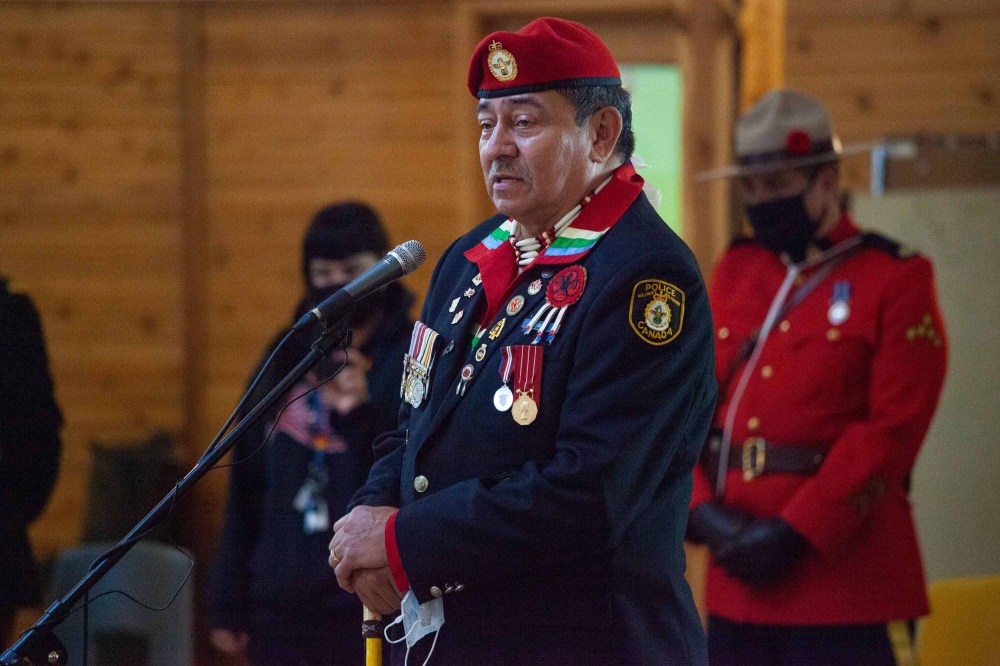
In April 2012, Swan suffered a stroke. He was initially treated at St. Boniface Hospital but was moved to Riverview Hospital where he spent many months going through rehab and trying to heal from the stroke. While he was there, he says he his cultural and traditional Indigenous healing practices were not respected.
“They totally disrespected me from the healing I was given from the (Long Plains) spiritual healer, Don Daniels,” he says. “They took away my medicine — my traditional medicine. They wouldn’t let me pray. They locked the doors. All kinds of stuff.”
While he was recovering, it was discovered that Swan had black spots on his heart. Specialists wanted to put in a pacemaker, but he refused.
“I said no, if you guys dig into my chest, you’ll kill me as a warrior.”
Swan was released that summer and headed to Big River, Sask., to see a traditional healer named Clifford Rabbitskin. There, Swan took part in a dark room ceremony and use traditional Indigenous healing methods and medicines.
His warrior life is one of triumphs and one of trials.
“I am traditional now. Through the years I have come back to the culture. I am a sun dancer, a traditional pipe carrier. I’ve learned to forgive a lot.”
An excerpt from his official Canadian Armed Forces bio sums it up best: “Melvin’s life is a journey of devotion to the Anishinaabe people, respect for the traditions as derived from the languages of his ancestors and to follow the ways of the Creator. It is a daily struggle.”
“I am traditional now. Through the years I have come back to the culture. I am a sun dancer, a traditional pipe carrier. I’ve learned to forgive a lot. I’ve learned to forgive a lot and be able to live and keep voicing and using platforms to deliver,” he says.
“Each time I tell my story, I give in order to help others. I’ve mentored a lot, I’ve been under the gun a lot. I’m the only one who’s beaten the military in this country, but now the military’s asking me for my guidance. It’s ironic. Because of all these bodies found at residential school, I think they’re trying to do some kind of reconciliation structure, which I’m helping with because it helps me when I give and am moving in the direction of healing, I too heal. It’s hard to explain because there’s a lot of anger and rage in me, and I’ll never surrender. Because of that, it prevents me from healing. Which is why I listen to my wife and say don’t fight,” he says.
“I think peace is where it’s at and for me, I’ve come to that peace. I’m 63 years old, I’ve lived a life of trials and tribulations. I’ve been a spiritual leader, a connection to the ancestors, I never lost the language — it’s more powerful today than it ever was. So I got it all… It’s a matter of going through it, and being where I’m supposed to be,” he says.
“I’ve been through a lot,” he continues. “I’m lucky to be alive.”
shelley.cook@freepress.mb.ca
Twitter @ShelleyACook
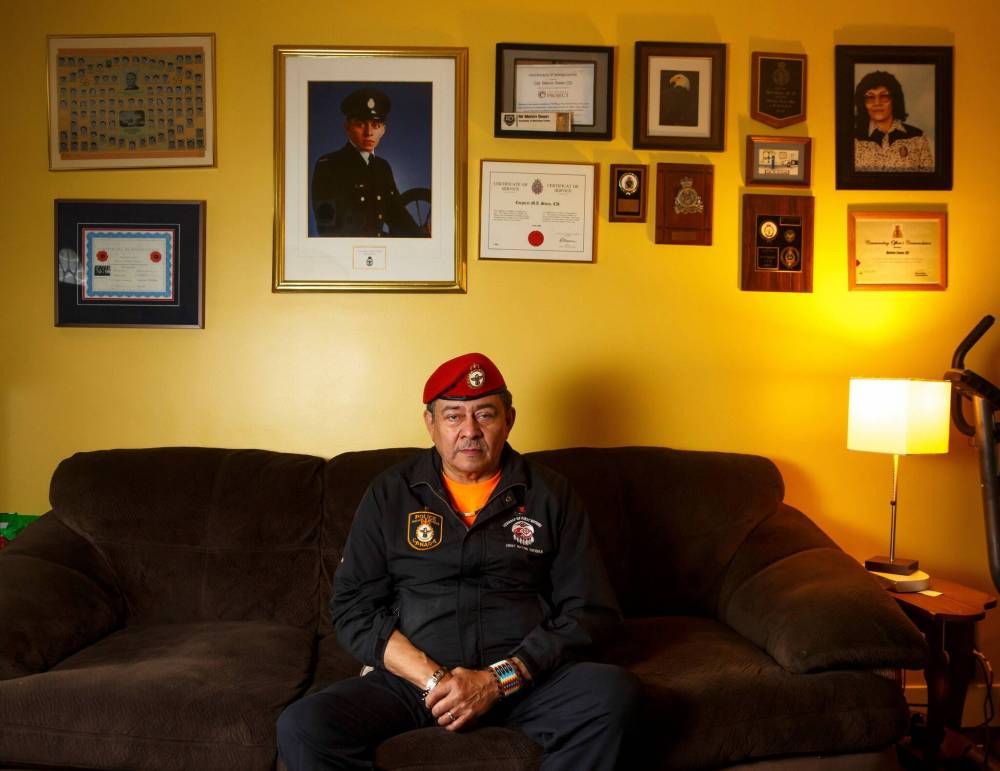

Shelley Cook
Columnist, Manager of Reader Bridge project
Shelley is a born and raised Winnipegger. She is a proud member of the Brokenhead Ojibway Nation.
Our newsroom depends on a growing audience of readers to power our journalism. If you are not a paid reader, please consider becoming a subscriber.
Our newsroom depends on its audience of readers to power our journalism. Thank you for your support.



